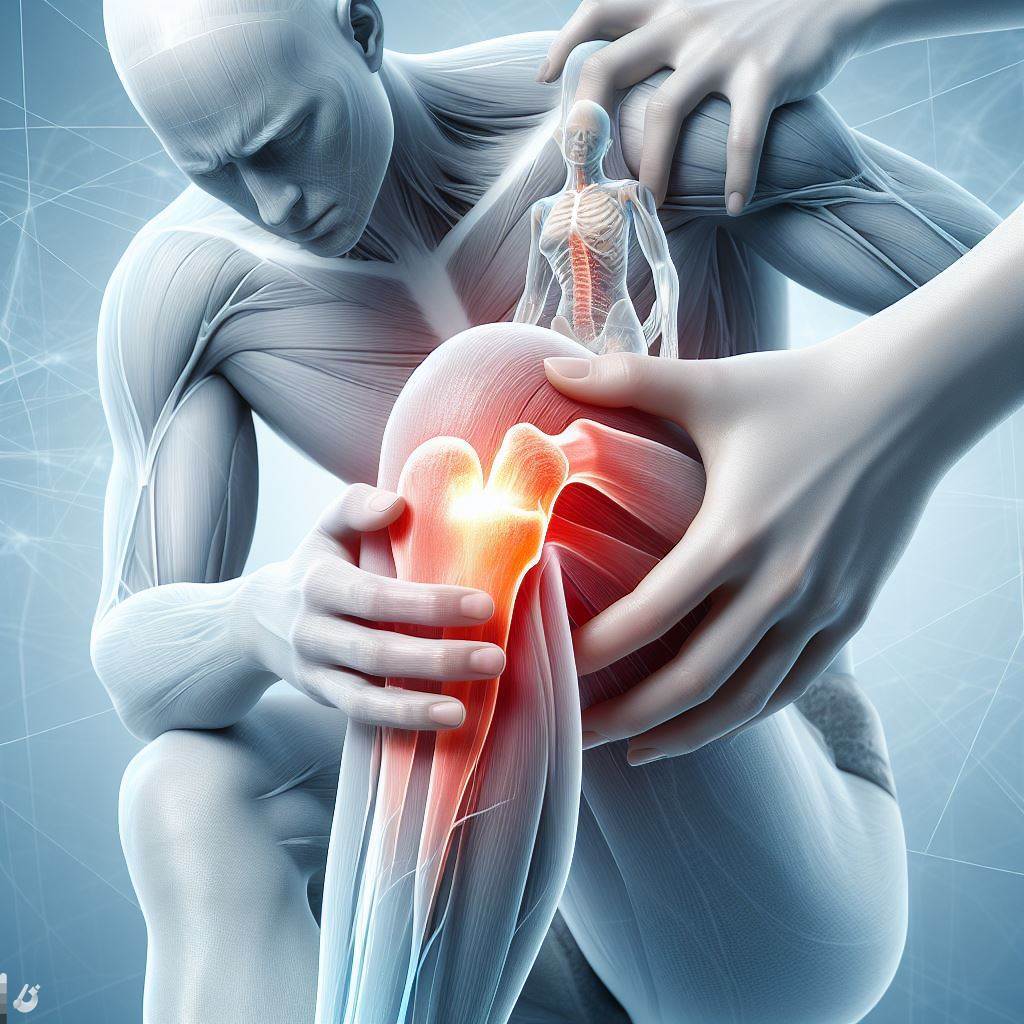In this step-by-step guide, “How to naturally manage pain and inflammation,” we aim to provide you with practical and empathetic advice on finding relief from these common ailments. We understand how debilitating and frustrating pain and inflammation can be, and we believe in the power of natural remedies to help alleviate these discomforts.
Our guide will take you through a series of steps, each designed to target these issues using natural and holistic approaches. We will explore various methods, including lifestyle changes, dietary adjustments, and alternative therapies, that can effectively manage pain and reduce inflammation without relying solely on medication.
By following our guide, you will discover how to incorporate gentle exercises and stretches into your daily routine to promote flexibility and relieve pain. We will also delve into the importance of proper nutrition and explore foods that possess anti-inflammatory properties, helping you make informed choices that support your overall well-being.
Moreover, we will introduce you to natural supplements and herbs that have shown promise in reducing pain and inflammation. These options can provide a complementary and alternative approach to conventional treatments, offering you a wider range of choices when it comes to managing your discomfort.
This guide will equip you with the knowledge and tools necessary to naturally manage pain and inflammation, empowering you to take control of your well-being. We understand that everyone’s journey to finding relief is unique, and we are here to provide guidance and support along the way.
Remember, managing pain and inflammation naturally is a holistic process that requires patience and consistency. By embracing these natural remedies, we believe that you can achieve a better quality of life and experience the relief you deserve.
Identify the source of pain and inflammation
To identify the source of pain and inflammation, we recommend starting with a self-assessment. Take note of the location and intensity of the discomfort, and any activities or movements that exacerbate it. If the pain persists or worsens, it is advisable to consult with a healthcare professional who can provide a more accurate diagnosis through physical examination and additional tests. Remember that pinpointing the source of pain and inflammation is crucial in order to effectively manage it naturally.
Implement a healthy diet
Incorporate anti-inflammatory foods into your daily meals. Include a variety of fruits, vegetables, whole grains, and fatty fish. These foods can help manage pain and inflammation naturally.
Stay hydrated
Drink an adequate amount of water throughout the day to stay hydrated and reduce inflammation. Hydration is crucial for supporting the body’s natural healing processes, so make sure to prioritize water intake. Aim to drink at least 8 glasses of water daily and carry a water bottle with you to remind yourself to stay hydrated.
Engage in regular exercise
Regular exercise has numerous benefits for reducing pain and inflammation in the body. To achieve this, we recommend engaging in exercises that focus on strengthening the muscles and increasing flexibility. Low-impact activities such as swimming, walking, and yoga are excellent choices as they minimize strain on the joints. Incorporating these exercises into your routine can help alleviate pain and improve overall well-being.
Practice stress management techniques
To reduce pain and inflammation, it is important to manage stress effectively. Incorporate stress management techniques such as deep breathing, meditation, or engaging in hobbies to promote relaxation and reduce inflammation. For deep breathing, find a quiet place and take slow, deep breaths in through your nose, then exhale slowly through your mouth. For meditation, sit comfortably and focus on your breath or repeat a calming mantra. Engaging in hobbies such as painting, gardening, or playing a musical instrument can also provide a relaxing and enjoyable distraction from stress.
Use natural remedies
Explore natural remedies such as turmeric, ginger, or omega-3 fatty acids, which have anti-inflammatory properties. Incorporate these ingredients into your diet by adding turmeric to your soups or curries, using ginger in teas or stir-fries, or including sources of omega-3 fatty acids like fatty fish or flaxseeds in your meals. Alternatively, you can also take supplements of these natural remedies after consulting with a healthcare professional to ensure the right dosage for your specific needs.
Apply heat or cold therapy
To apply heat therapy, start by preparing a warm compress or heating pad. Place the warm compress or heating pad on the affected area and leave it on for 15-20 minutes. This can help relax muscles and alleviate pain. For example, you can fill a sock with rice, microwave it for a minute or two, and then apply it to the sore muscles.
To apply cold therapy, begin by preparing an ice pack or a bag of frozen vegetables wrapped in a thin cloth. Apply the cold pack to the affected area for 10-15 minutes. This can help numb the area and reduce inflammation. For instance, you can fill a plastic bag with ice cubes, wrap it in a towel, and gently press it against the injured area.
Remember to always check the temperature of the heat or cold therapy before applying it to your body to ensure it is not too hot or too cold. If you experience any discomfort or prolonged pain, consult a healthcare professional.
Get enough restorative sleep
To ensure you get enough restorative sleep, it is important to practice good sleep hygiene. This includes setting a consistent sleep schedule, avoiding stimulants such as caffeine before bed, and creating a comfortable sleep environment. For example, try to go to bed and wake up at the same time every day, remove electronic devices from your bedroom, and make sure your mattress and pillows provide adequate support. By following these steps, you can improve your sleep quality and effectively manage pain and inflammation.
Seek professional help if needed
If natural remedies and self-management techniques do not provide sufficient relief, seek professional help. Consult with a healthcare professional to receive personalized advice and recommendations for appropriate treatment options. They can evaluate your condition, offer expert guidance, and ensure you receive the necessary care for optimal relief. Remember, reaching out to a healthcare professional is crucial in addressing your health concerns effectively.
Effective Strategies for Relief
In conclusion, we have explored various ways to naturally manage pain and inflammation. By identifying the source of the pain, implementing a healthy diet, staying hydrated, exercising regularly, practicing stress management, using natural remedies, applying heat or cold therapy, getting enough restorative sleep, and seeking professional help when necessary, we can effectively alleviate pain and reduce inflammation in our bodies. By adopting these natural strategies, we can empower ourselves to take control of our health and well-being. Remember, it is important to consult with a healthcare professional before making any significant changes to your lifestyle or trying new remedies.
Effective Home Remedies
Step-by-Step Guide to Harness the Power of Natural Remedies for Optimal Health
- Start by doing research: Begin by gathering information about natural remedies for health. Look for reliable sources such as books, reputable websites, or consult with a healthcare professional who specializes in alternative medicine
- Understand your specific health needs: Identify the specific health issues or concerns you want to address with natural remedies. This will help you focus your research and find remedies that are most suitable for your needs
- Choose the right remedies: There are numerous natural remedies available, so it’s important to select ones that are safe and effective. Consider factors such as scientific evidence, traditional use, and personal experiences of others. It’s also important to understand any potential interactions or side effects
- Start with simple remedies: As a beginner, it’s best to start with simple remedies that are easy to use and have a lower risk of adverse effects. For example, herbal teas, essential oils, or dietary changes can be good options to begin with
- Follow instructions and guidelines: When using natural remedies, it’s crucial to follow the instructions provided. Pay attention to dosage, preparation methods, and any precautions or warnings. If in doubt, consult with a knowledgeable healthcare professional
- Remember, natural remedies may not work for everyone, and it’s essential to listen to your body and seek professional guidance if needed
Frequently Asked Questions about Natural Remedies for Health
How can we use natural remedies to support cardiovascular health and maintain a healthy heart?
To support cardiovascular health and maintain a healthy heart, we can incorporate natural remedies into our lifestyle. Here are some methods that have been found to be beneficial:
- Eat a heart-healthy diet: Consuming nutrient-rich foods is crucial for maintaining cardiovascular health. Include fruits, vegetables, whole grains, lean proteins, and healthy fats like those found in nuts, seeds, and fish. Avoid processed foods, excessive salt, and trans fats.
- Exercise regularly: Engaging in physical activity helps strengthen the heart and improve overall cardiovascular health. Aim for at least 150 minutes of moderate-intensity aerobic exercise or 75 minutes of vigorous exercise each week. Consult a healthcare professional before starting any exercise program.
- Maintain a healthy weight: Being overweight or obese can increase the risk of heart disease. By adopting a balanced diet and exercising regularly, we can achieve and maintain a healthy weight, reducing strain on the heart.
- Manage stress: Chronic stress can negatively impact cardiovascular health. Practicing stress-reducing techniques such as meditation, deep breathing exercises, yoga, or engaging in hobbies and activities we enjoy can help promote a healthy heart.
- Limit alcohol consumption: Excessive alcohol intake can lead to high blood pressure and other heart-related issues. Moderation is key, and it is recommended to limit alcohol intake to moderate levels (up to one drink per day for women and up to two drinks per day for men).
- Quit smoking: Smoking is a major risk factor for heart disease. Quitting smoking is one of the best things we can do for our cardiovascular health. Seek support from healthcare professionals or support groups to overcome nicotine addiction.
- Incorporate heart-healthy herbs and supplements: Some natural remedies, when used in consultation with a healthcare provider, may support cardiovascular health. These include garlic, omega-3 fatty acids, green tea, hawthorn, and coenzyme Q10. However, it’s important to note that supplements should not replace a healthy lifestyle or prescribed medications.

